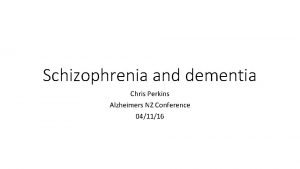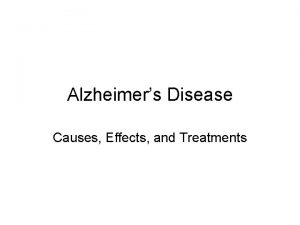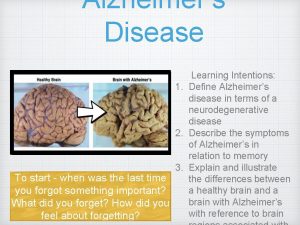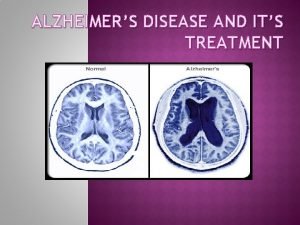Alzheimers Disease and Mercury Exposure Effects of Mercury












- Slides: 12

Alzheimer’s Disease and Mercury Exposure. Effects of Mercury Consumption and Environmental Exposure. Daniela Martinez

Alzheimer’s Disease. • -What is it? • A form of dementia. A loss of brain function that occurs with certain diseases. • -Symptoms • Mild cognitive impairment (normal to severe) • Language problems. • Personality changes/ loss of social skills. • Emotional behavior or personality changes • difficulty solving problems • Forgetting recent events or conversations

Amyloid-beta peptide • • Amyloid-beta peptide plaques are believed to be one of the causes of Alzheimer’s disease. These plaques are also believed to be found in patients with down syndrome. -Proceedings of the National Academy of Sciences of the United States of America.

Alzheimer’s Disease • Physical symptoms • Trouble Swallowing • Incontinence • Diagnosis • Neurological and physical exam • Medical Family history. • Alzheimer’s patients display Neuritic Plaques (clusters of dead and dying nerve tissue) Senile Plaques (dying nerve cells accumulate around protein), and neurofibrillary tangles (twisted fibers clog cell) (U. S. national library of medicine) •

Mercury Poisoning • Methods of exposure • -Mercury metal- Air vapors. (broken thermostats, dental fillings, light bulbs, some athletic shoes, and noise-making toys) • -Inorganic mercury (alkaline and button batteries, nasal sprays, some ointments) • -Methyl mercury occurs with the consumption of certain fish (saltwater and fresh) these include Sharks, large-mouth bass, chain pickerel, and swordfish. Passed through breast milk. • - Phenyl mercury is the mercury found in cosmetics made before 1991. •

Alzheimer’s disease Brain • • • -Traces Mercury have been found in the Pituitary gland. (Biological trace element research. ) -High Mercury exposure in specific brain regions may play a role in Alzheimer’s disease. In control groups, higher concentrations of mercury were traced in patients with Alzheimer’s than with healthy individuals. (1986. Ehmann et al) (Amygdala, hippocampus, Nucleus basalis)

Correlation Between Mercury and Alzheimer’s. • • • According to Dr. Richard Deth, who conducted a peer-reviewed study for The Journal of Alzheimer’s Disease: "Since the brain is more vulnerable to oxidative stress than any other organ, it is not surprising that mercury, which promotes oxidative stress, is an important risk factor for brain disorders. " -Dr. Deth

Mercury levels in people with the disease. • • • In 1998, the University of Basel in Switzerland organized a control study that measured blood levels of mercury in Alzheimer’s patients. Groups measured: 33 with AD 45 with Depression 65 other non-psychiatric disorders Blood Mercury levels in AD patients (. 0002), other control groups (0. 000)

Demographics • • • Over 5. 4 million Americans have AD (all ages) -one in eight people 65 or older have AD -four percent of people under 65 have AD -3. 4 mil male -1. 8 mil female -Chicago health and aging project.

Demographics • "Since the brain is more vulnerable to oxidative stress than any other, it is not that mercury, which promotes oxidative stress, is an important risk factor for brain disorders. "

Medications Cholinesterase inhibitors- keeps acetylcholine levels high. - Aricept, Exelon, Razadyne, Cognex, and Memantime. (memory loss and reasoning treatments) -Vitamin E protects brain cells. (antioxidant) -Omega-3 fatty acids -IVIG (delay of disease by three years)

Prevention • • • - No routine clinical testing of AD genes recommended. - Physical exercise. (increase brain blood flow. Cardiovascular system. ) - Mediterranean diets.
 Managing economic exposure and translation exposure
Managing economic exposure and translation exposure Transaction exposure vs economic exposure
Transaction exposure vs economic exposure Managing economic exposure and translation exposure
Managing economic exposure and translation exposure Operating exposure
Operating exposure Bharathi viswanathan
Bharathi viswanathan Georgia alzheimers planning
Georgia alzheimers planning Fast score for dementia
Fast score for dementia Alzheimers sjukdom
Alzheimers sjukdom Alzheimers nz conference 2020
Alzheimers nz conference 2020 Historical research
Historical research Alzheimers society contented dementia
Alzheimers society contented dementia Alzheimers eye test joke
Alzheimers eye test joke Nature of exposure and risk
Nature of exposure and risk






















